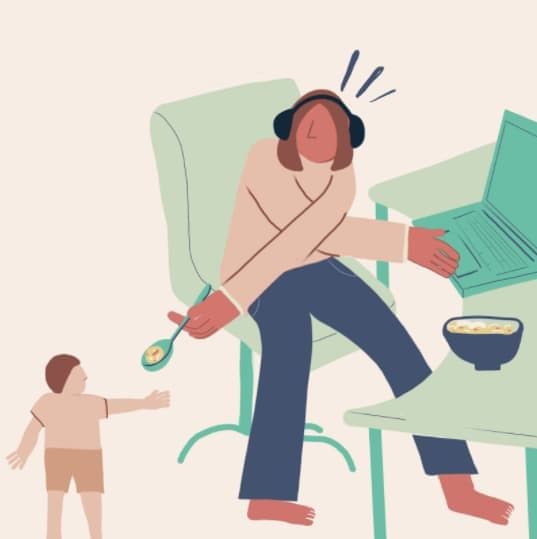This blog has been compiled by Komal Adhlaka, a content writer for Proactive For Her.
As a new mother who started a brand new job in the pandemic, I feel very grateful for having what most people would crave for in this past year. 2020 has left so many of us grieving the loss of a loved one and the loss of a dependable livelihood to support our family.
But there are times when I also feel whether I'm failing at it all. As mothers we tend to constantly question if we are giving our best. Saying no to a child's request is never an option. "Would you help me with my homework?" "Ofcourse I will" , "would you read me a story?" "Ofcourse I will". And ofcourse, that comes at the cost of a mother's mental and physical health.
While Covid-19 restrictions were to ensure your physical health, staying at home 24*7 has massively increased stress levels as parents are struggling to balance home, childcare, and work, amidst a pandemic. The pandemic has been particularly devastating for working mothers, as many have stepped back from their jobs due to increased childcare responsibilities. Since women are often the primary caretaker of kids, juggling and balancing work and family have put them under immense stress and have affected their mental health in some cases.
But let's break this down. Why are mothers affected ?
Working from home has brought about an expanded workload for most women.
The absence of childcare support
While some of us were fortunate to have parents and parents-in-law watching our babies, the mothers balancing nuclear families were hit harder. Daycares closed down and nannies refused to show up. This only meant that our kids made more appearances over zoom meetings. For many essential workers, it also meant giving up jobs to stay at home for the kids.
The loss of domestic help
With various gated communities in urban cities not permitting house help to enter the premises, the onus fell on the women to assume responsibility for domestic work. They are overworked and exhausted owing to various responsibilities during the lockdown.
The fear of losing a job
The pandemic hit our economy hard and people lost jobs like moms lose postpartum hair (we've all been there). In ordinary circumstances, mothers would have highlighted the difficulty of balancing work but the anxiety of losing a job made many women push through these difficult periods.
Sleep, energy, mealtimes all took a hit and eventually affected mental health
The absence of our gang of girls, soul sisters and support systems
Social distancing to avoid contracting the virus has prompted an increase in anxiety levels among women. The hangouts that serve as an outlet and a safe space are restricted to zoom calls and holding babies, once a month if lucky. A lot of single mothers find themselves juggling these responsibilities without a partner and no childcare support.
The pandemic has made it all the more difficult to balance on lower income if a partner has lost a job. If, in a family, a man loses a job, a working woman is under immense pressure to be the sole breadwinner in the family.
But as mothers it's very important to know and understand that you are doing your best. And you've done a lot. You should be proud of yourself. Motherhood is a job where you're getting up and showing up. Every. Single. Day.
If you aren't feeling the same or if you feel you need more support to get your mental health on track, so be it. Reach out and find the correct resources to empower you. Mental health changes can be subtle.
If you or any super moms that you know have been facing any symptoms of anxiety, depression and overexhaustion such as:
- Fatigue and reduced of energy, so even little errands require additional effort
- Emotional outbursts and breakdowns
- Irritability or dissatisfaction
- Food cravings or lack of appetite
- A sleeping disorder or unpredictable sleep patterns and schedules
- Loss of interest in daily activities
- Poor concentration and memory
- Physical complaints , for example, back pain or headaches
- Social isolation
Then reach out for help. There are plenty of resources in the form of support groups, online communities and most importantly trained mental health practitioners to help you through this process.
What can women do for their mental health?
While various helplines and medical facilities are available, one can implement a few changes to take care of their mental health during these unprecedented times.
- Saying "NO" is alright: It is not possible for anyone to take on ALL responsibilities and assignments. You can cordially deny a request from the office or if it's a demand at home, you can request that it stand by till you have the opportunity to do it.
- A devoted office at home is worth a try: Your home office does not need to be anything fancy! A simple desk and comfortable work space can help increase your productivity and help you feel like you are working in a professional climate.
- Exercise: Add a thirty-minute physical workout routine to your day. Give going a shot for a walk, a bike ride, yoga, or meditation. It helps in releasing tension and managing stress.
- Develop a daily practice: When you coordinate your assignments and layout your objectives, you mentally set yourself up for what's in store during the day. Planning ahead can make it easier for you to r accomplish the objectives you set out to achieve!
- Spend time with family and friends: Talk to your near and dear ones and visit them regularly. Sharing your concerns will help you venting out and also discovering solutions to your problems, if any.
- Talk with a professional: Seeking a mental health expert’s advice can make a big difference. When you have thoughts, emotions or behaviors that are out of control, and eventually they are affecting your relationships, your work or your sense of well-being, it is better to consult a mental health expert.
- Don't neglect your physical health either: We need our health and immunity now more than ever. So don't miss your annual physical examinations or your medications just because of Covid. Work on yourself and your health.
If you are one of those mothers that had to give up their job this year, use this time to hone your skills and pick up a few others. The pandemic created a lot of room for online learning. Take that opportunity to boost your resume.
Being honest and completely transparent with your future employer will help you find a workplace that is a better cultural fit.
The evolving nature of mothers workplaces
Numerous employers have permitted their employees to work flexible hours from home or to adjust their shifts during nights, weekends. Provisions have been made for women, considering their responsibilities towards themselves, families, profession and childcare.
Mothers will inevitably worry about their children while at work. And you're definitely not alone. Find mom friends at work who understand what you experience and maybe able to share insights. If you are experiencing difficulties coping with this transition reach out to the relevant people at the workplace to discuss your concerns. Provisions of work-from-home may enable mothers who are raising young children to balance family and professional responsibilities better.
Final Thoughts
Unemployment during the coronavirus pandemic has affected women so disproportionately that many analysts are referring to the economic crisis as a “she-cession.”All women, but particularly working mothers, stress out normally, and this pandemic has aggravated their stress and anxiety levels. But all is not lost. This pandemic has brought to light the amendments that can be made to make workplaces more inclusive, empathetic and flexible. Mothers will emerge at the end of it, more capable and victorious!
Proactive for her is a digital clinic for women, offering accessible, personalized, and confidential health-care solutions. We offer products and services for out-patient health concerns of Indian women, across their lifetime - from puberty to pregnancy to menopause. To know more on the sexual and reproductive health of women, visit https://www.proactiveforher.com/

